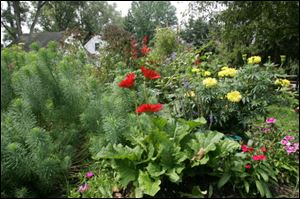
WEED IT & REAP: Marcella Mackey has 'learned the meaning of retired'
10/12/2010
Weed It & Reap goes dormant with this, our 24th article. Every Wednesday since May, we have featured a gardener, with a goal of showing the wonderful range of people who love this past time.
To read their stories, go to toledoblade.com and type Weed It & Reap in the search box.
We plan to regenerate Weed It & Reap in Spring, 2011, when we'll seek a fresh crop of folks who tend gardens large and small.
Garden specs: On one acre I have 24 to 26 garden spaces ranging in size from 44 feet by 3.6 feet along a fence, to 20 feet by 14-feet for a bed that looks like a music note. The piano bed — it looks like a baby grand piano or the state of Texas depending on how you want to look at it — is 22 feet by 12-feet. An iris/sweet pea area is 13.4 feet by 5-feet; the rose bed is 9 feet by 15-feet, and so on. Most beds feature something different, although they're not themed areas.

When did you start gardening? Until 1979, I absolutely hated gardening, but my husband kept building garden spaces. I'm one of these Type A personalities that needs to go and go and go. Gardening was down time; it never appealed to me. And I wasn't crazy about getting dirty.
It soon became obvious that if there was to be anything other than weeds growing in these spaces, I would have to plant them. At first I relied on trial and error, mostly error. But my increasing interest sent me to books, articles, and conversations with nurserymen: if I was going to put in all this time and effort, I wanted them to survive and thrive.
My husband knew me well enough to know this was something I would like and that we could do together.
What do you grow? Perennials and annuals, and in the past two years I've interspersed a few vegetables with the flowers. I've got eggplants, tomatoes, and a 12-foot-by-4-foot bean patch.
What do you get out of it? Now I'm different: I like the down time, you can think about things. I've learned the meaning of retired. Aside from the "me time" and a sense of accomplishment, my greatest pleasures are in seeing the enjoyment that others get from visiting my gardens, and sharing garden information as well as plants.
Hours spent gardening: I sometimes think I live in the garden from the time the weather begins to look and feel like spring. I don't think it would be an overstatement to say easily 250 hours goes into my gardens each season. Sometimes we'll spend all eight hours out there.

Cypress spurge in a blooming garden.
Annual expense: It varies depending on how much compost and mulch are needed and how many perennial replacements I need due to winter loss. Clarence was an accountant and he totaled it up at $3,000 for 2010.
Challenges: The nine feet of water we sometimes get in the back yard courtesy of Swan Creek in the spring. It doesn't reach most areas, but it often damages two larger beds.
I'm proud of having completed the Master Gardener program. I gained extensive technical knowledge and a new interest and respect for volunteerism and what it contributes to the beauty of the area as well as economically with community-garden programs such as Toledo Grows.
I tried straw-bale gardening this year and will do it again next year. The bale is seasoned with a high-nitrogen granular fertilizer and water, and when it's ready, the plant's roots are tucked into the straw. The bale's interior starts turning into compost. I have two bales in an area where nothing grows under pine trees, with sweet potato vines, vinca, and wave petunias. It's an oasis. These are nice for people who live in condos. You can even put them on cement. And you can stack a couple to grow vining plants that require a lot of space such as squashes. The down side is you have to water constantly because the straw does not hold water.
Most used tool: Any tool that helps get rid of weeds.
Word to the wise: Take the time to deadhead your plants. They'll be healthier.